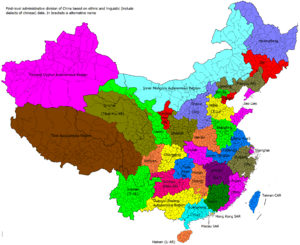Guangdong Independence Movement facts for kids
Guangdong Independence refers to the idea that Guangdong, a large province in southern China, should be an independent country, free from outside control. This idea has been suggested by different people throughout history. For example, a writer named Ou Shi wrote about creating a "Guangdong of Guangdong."
In 1911, a big change called the Xinhai Revolution happened in China. During this time, leaders in Guangdong declared their independence on November 9, 1911. They formed the Guangdong Military Government. However, when the Republic of China was established on January 1, 1912, Guangdong became one of its provinces. Later, there was a plan for Guangdong to have more self-rule, but it didn't get enough support and wasn't put into action.
A Look at the Past
Early Ideas of Independence
Around the early 1900s, China was facing many challenges. A powerful official named Li Hongzhang visited the British Governor of Hong Kong, Buli. During their talk, Buli suggested that Guangdong and Guangxi (another province) might consider separating from the Qing government, which ruled China at the time. This shows that the idea of Guangdong being separate was discussed even then.
Later, a person named He Qi also tried to convince Hong Kong and Britain about changes for China. He reported that Governor Buli supported the idea of a republic (a country led by elected officials) in South China.
Students and Self-Rule
The Qing government signed many agreements that gave away land or paid money to other countries after losing wars. In 1901, there was a concern that Guangdong might be given to France. Because of this, Cantonese students studying in Japan, like Feng Si Luan and Wang Chonghui, started the Guangdong Independent Association. They believed that the people of Guangdong should decide their own future, not the Qing government. More than 200 people joined this group, including Cantonese people living overseas.
Inspiration from Taiwan
After losing a war in 1895, the Qing dynasty had to give Taiwan to Japan. Many people in Taiwan did not want to be ruled by Japan. So, they formed their own country called Taiwan Democracy in May 1895. Even though this country only lasted a short time, it inspired ideas of independence and self-rule in other parts of China, including Guangdong.
New Ideas and Publications
In 1903, a book called "New Guangdong" was published. This book talked about the idea of Guangdong being independent. Around the same time, a student from Hunan named Yang Shouren published "New Hunan," which was influenced by the ideas in "New Guangdong." These books suggested that different regions of China should have more control over themselves. The Qing government tried to stop the spread of these ideas by banning these publications in 1905.
Guangdong's Role in the 1911 Revolution
When the Wuchang Uprising happened in 1911, leading to the end of the Qing dynasty, people in Guangdong also started planning their own independence. On November 9, the Guangdong Counseling Bureau officially announced Guangdong's independence from the Qing rule. This was a chance for local leaders in Guangdong to put their ideas of self-rule into practice.
Modern Views on Identity
Today, some experts discuss these historical movements. Melissa J. Brown, a professor from Stanford University, has researched how different regions in China see themselves. She believes that movements like Guangdong independence can make people think more deeply about what it means to be "Chinese" and how different regions relate to the central government.
An economic historian, Mark Koyama from George Mason University, has also noted that some Chinese regions, like Shanghai and Hong Kong, show strong desires for more independence. He points out that China's history often includes periods of division, suggesting that such patterns might appear again in the future.
In Books and Stories
The idea of Guangdong independence has also appeared in fiction.
- Japanese writer Masahiro Miyazaki wrote a military novel in 1999 called "China's Guangdong Army Uprising." In this story, South China divides during a conflict between China and Japan.
- Another Japanese novelist, Mori, included Guangdong independence in two of his military novels: "The New Japan-China War" (1995-2003) and "The New Japan-China War-The Century of the Raging Waves" (written about the fictional 2020s). These stories imagine internal power struggles in China leading to regional conflicts, including Guangdong seeking independence.
Impact on Society
Public Messages
On March 12, 2018, news reports showed that messages like "Guangzhou Independence Hong Kong," "Guangdong Independence," and "Free Cantonia" were written on public places in Guangzhou. These messages appeared on transportation and walkways. Some media outlets that oppose independence movements saw this as a sign of Hong Kong's independence ideas spreading to mainland China. They also stated that people should not damage public property.
Independence Movement Meetings
On August 23, 2019, a meeting of groups supporting independence movements was held in Washington. This meeting was organized by the Template:Link-wuu and the Uyghur American Association. People from Hong Kong, East Turkestan, South Mongolia, and Guangdong, who support independence for their regions, attended this event. Members of the China Democracy Movement were also present.
Future Thoughts
A Leader's Vision
In April 1979, Xi Zhongxun, who was a top leader in Guangdong Province at the time, asked the central government for more power for Guangdong. He even said that Guangdong might become like an "independent country" in a few years if it had more control over its own affairs. This statement caused a lot of discussion at the meeting.
Economic Strength
On September 11, 2008, a newspaper called Southern Metropolis Daily published an article titled "If Guangdong is an Independent Economy." The article asked readers to imagine Guangdong as its own country. It suggested that if Guangdong were an independent nation, its economy would be the 14th largest in the world. This idea helps people think about Guangdong's strong economic power.
Images for kids
 | Precious Adams |
 | Lauren Anderson |
 | Janet Collins |



